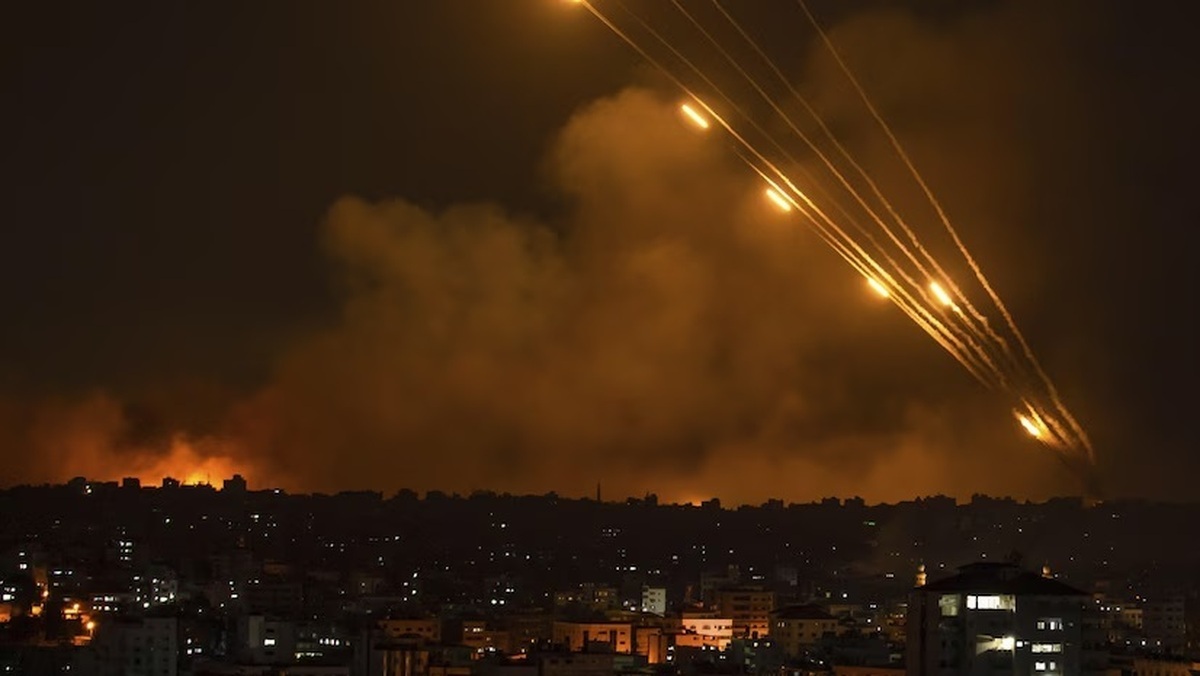Iran has launched a massive ballistic missile attack on Israel, firing ‘up to 100 missiles’ in response to the Israeli airstrike that killed Hassan Nasrallah, the leader of Hezbollah in Beirut, and Ismail Haniyeh, the leader of Hamas in Tehran this year, the Fox News Chief Foreign Correspondent Trey Yingst reported on Twitter. In a press conference, the Israeli Defense Forces (IDF) confirmed the missile launch and said that they activated the Iron Dome defense system as projectiles flew toward Tel Aviv and Jerusalem. The attack is still ongoing as the situation remains explosive with a second wave of missiles reportedly heading towards the country.
Escalation and Risk of Broader Conflict
The missile strike heralds a new era of confrontation between Iran and Israel that could draw the Middle East into a full-fledged war. Israel and Iran have been at each other’s throats for years, waging proxy wars with each other via groups such as Hezbollah in Lebanon and Hamas in the Palestinian territories. But this first direct military attack raises fears that the conflict could quickly escalate into a multi-front war, with neighbouring countries such as Lebanon and Syria drawn into the conflict, where Iran already has a strong presence through its proxy militias.
As The Times of Israel reports, the attack was ‘the deepest missile strike into Israel by Iran in years’, and has already prompted sirens to blare in cities across Israel, including Tel Aviv and Jerusalem. The IDF spokesman Rear Adm Daniel Hagari told the Israeli public that Israel’s military is prepared ‘for both defense and offense’, while asking residents to ‘enter to the designated protected spaces’. While military tensions escalate, however, there are growing fears that the conflict will not remain bounded by Israeli and Lebanese borders.
U.S. Involvement and Risk of Global Conflict
The missile strike raises the question of escalation, particularly on the part of the US. With US forces based in the region, and the US’s close alliance with Israel, a further Iranian escalation is likely to bring Washington into the equation. The Biden administration has repeatedly supported Israel’s right to self-defense. A direct Iranian attack on Israel raises the stakes, however. An American military response might involve a similar escalatory dynamic to that described above: any US action could lead to a broader conflict, involving other global powers such as Russia with a stake in the Syria conflict, and a possible globalization of the conflict.
The US has been in the region anyway. Just last week, the Pentagon announced it was sending 1,000 more troops to the Middle East to supplement the 40,000 soldiers already deployed there. As Reuters broke the news, the US special envoy to Iran Robert Malley said the US ‘will continue to support Israel’s right to defend itself from Hezbollah attacks and Iranian-sponsored attacks by other groups’. The fact that Israel launched Operation Guardian of the Walls in a bid to move the world closer to confronting Iran, in the Gaza Strip, opens the prospect of a wider war with unpredictable outcomes. The world now waits to see if the US will further intervene.
Impact on the U.S. Election and Political Fallout
The unfolding war could also be crucial in the run-up to the US presidential election of 2022. President Joe Biden and his vice-president Kamala Harris will come under pressure for their Middle East policy. Hypocritical critics are already arguing that the US has allowed Iran to dominate the region, citing the ongoing negotiations over the US nuclear deal with Iran (JCPOA).
Indeed, the former president Donald Trump in particular has been outspoken about the Biden administration’s responses to date, also blaming the ‘Harris-Biden regime’ for a range of other alleged failures, including inflation and national security missteps. With the missile attack now making headlines, Trump and other Republican candidates are likely to seize the narrative, urging voters to view the situation as yet another sign of foreign more the US becomes drawn likely it becomes that the challenges facing Biden and Harris central issue in the election, with the incumbent president and vice-president facing the prospect of widespread criticism over how they have handled foreign relations and national defense.
Could This Lead to World War 3?
With the temperature soaring, the question is: could this war escalate into a major war, maybe even another world war? Israel has been fighting Hamas, Hezbollah and Iran, but with Iran now taking a direct role, we have a very different situation. That, together with the possibility of retaliations against US and Israeli interests around the world, could draw in regional actors such as Syria and Lebanon, as well as global actors such as Russia and the US.
Second, Iran could continue its missile strikes and provocations against the US and other countries, which might draw in other NATO allies, and eventually create an international coalition against Iran. Miscalculation could happen at any time in the unstable Middle East, where the alliances are fragile and the crises can easily spread. A prolonged conflict involving the major powers could prove catastrophic to world stability.
Meanwhile, world leaders are trying desperately to find a way of negotiating an end to the crisis. Yet the missiles are already flying, and there appears to be no easy way to step back from the brink.
For live updates, follow Fox News and Reuters.

